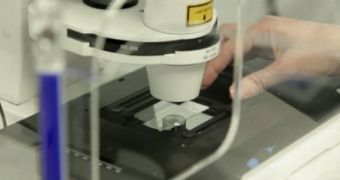A group of investigators with the Trinity College Dublin (TCD), the oldest university in Ireland, has just announced the discovery of a new avenue of research in finding a treatment against age-related macular degeneration (AMD), a condition that affects millions of people around the world, and can lead to blindness. The team says a component of the immune system may be involved in this process.
In their latest study, the investigators were able to determine that the interferon-gamma inducing factor (Interleukin-18) protein plays a significant role in protecting eyesight in humans, by preventing the development of the retinal blood vessels that are the hallmark of AMD. This proinflammatory cytokine molecule is encoded in the human body by the IL18 gene.
The role the IL18 protein has as a guardian for eyesight has remained a mystery until now. TCD experts are the first to determine that the production of damaging blood vessels in the eye can be suppressed if sufficient amounts of IL18 are present. In a series of related experiments, the team was also able to demonstrate that the protein can be administered to patients non-invasively.
This has major implications for treating AMD, since the array of treatment options currently available to patients is not that wide. These experiments were just part of pre-clinical models, but the research group is convinced that clinical trials will reveal the efficiency of IL18 administration as a therapy against AMD.
“We were initially concerned that IL-18 might cause damage to the sensitive cells of the retina, because it is typically linked to inflammation. But surprisingly we found that low doses had no adverse effects on the retina and yet still suppressed abnormal blood vessel growth,” says expert Sarah Doyle.
She holds an appointment as an assistant professor in immunology at TCD, and is also the first author of a new paper detailing the findings. The work was published in this week's online issue of the esteemed scientific journal Science Translational Medicine. TCD research assistant professor in genetics, Matthew Campbell, was a coauthor on the new research.
“Our findings have highlighted the power of industry-academic collaborations, the results of which should lead to clinical deployment of IL-18 as a treatment for AMD in the short term,” he explains.
The new study was made possible by support and grants from Enterprise Ireland, Science Foundation Ireland, the Brightfocus Foundation in the United States, and GlaxoSmithKline, one of the largest pharmaceutical companies in the world. AMD was selected as a target for research because of its widespread incidence in the general public.
“A greater understanding of the molecular complexity of diseases such as AMD is critical to the development of new medicines,” concludes Dr. Pete Adason, who is the vice president of Ophthalmology at GSK.

 14 DAY TRIAL //
14 DAY TRIAL //